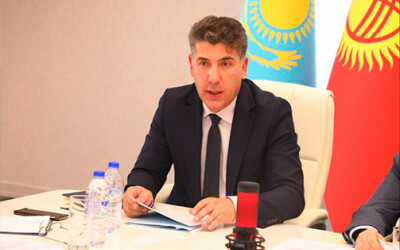Akramjon Nematov, First Deputy Director of ISRS: Sustainable Development in Central Asia has a positive effect on the entire SCO space

Uzbekistan and Central Asian states are among the main beneficiaries of the Shanghai Cooperation Organization, First Deputy Director of the ISRS under the President of the Republic of Uzbekistan Akramjon Nematov said at the opening of the roundtable titled "Samarkand Process: SCO Modernization Prospects" in Tashkent.
Thanks to the well-established dialogue and cooperation between the SCO member states, our region maintains a high level of socio-political stability and there is security and sustainable socio-economic development in the region," the expert said.
In this regard, Akramjon Nematov noted that Central Asia is one of the most dynamically developing regions today. Thus, since 2000, since the creation of the SCO, the GDP has grown almost nine times - from $46 billion to almost $400 billion. Another achievement has been the maintenance of high rates of economic growth.
In 2022, the average annual economic growth rate in the region was more than 6 percent, which is 2 times higher than global rates of only 3 percent.
At the same time, the expert stressed, Central Asia has become an important participant in world economic relations: the volume of its foreign trade over the past 20 years has increased 8-fold, reaching about $225 billion.
At the same time, Akramjon Nematov pointed out, mutual trade between the countries of the region is growing faster than their total foreign trade. The share of mutual trade in goods in the total volume of foreign trade turnover in Central Asia increased from 6% in 2014 to just under 11% in 2022.
In addition, he noted, thanks to relative stability, foreign direct investment in the region has increased annually, growing 20-fold from 2000 to today to more than $250 billion.
In turn, the development of the region has contributed to the steady growth of the population, which has increased from 55 to 80 million people in just over 20 years.
As a consequence, he stressed, thanks to these achievements today Central Asia, using its powerful resource and raw material potential, human capital and production base, is entering a new stage of its development and becoming an important link in the production and logistics chain of added value.
According to him, the above-mentioned trends have a positive effect on the entire SCO space. Central Asia's sustainable development strengthens the region's role as a kind of "gateway" and a land bridge linking a number of strategically important regions of Eurasia.
"This, in turn, opens up great opportunities and prospects for member countries to ensure the unimpeded transit of goods, increase mutual trade turnover, and access of national products to each other's markets," Akramjon Nematov concluded.
For information: The International roundtable was organized by the Ministry of Foreign Affairs in partnership with the Institute for Strategic and Regional Studies under the President of Uzbekistan and with the assistance of the International Institute for Central Asia. Leaders and experts from leading think tanks of the SCO member states took part in the event.
The event discussed the issues of raising the effectiveness of SCO activities. The participants outlined their visions and approaches to modernization of the Shanghai Organization and its adaptation to new realities
Next

A roundtable on "Samarkand Process: SCO Modernization Prospects" was held in Tashkent today. Speaking at the event, First Deputy Director of the ISRS under the President of the Republic of Uzbekistan Akramjon Nematov outlined priority directions in the context of reforming the SCO activities.
14.06.2023





